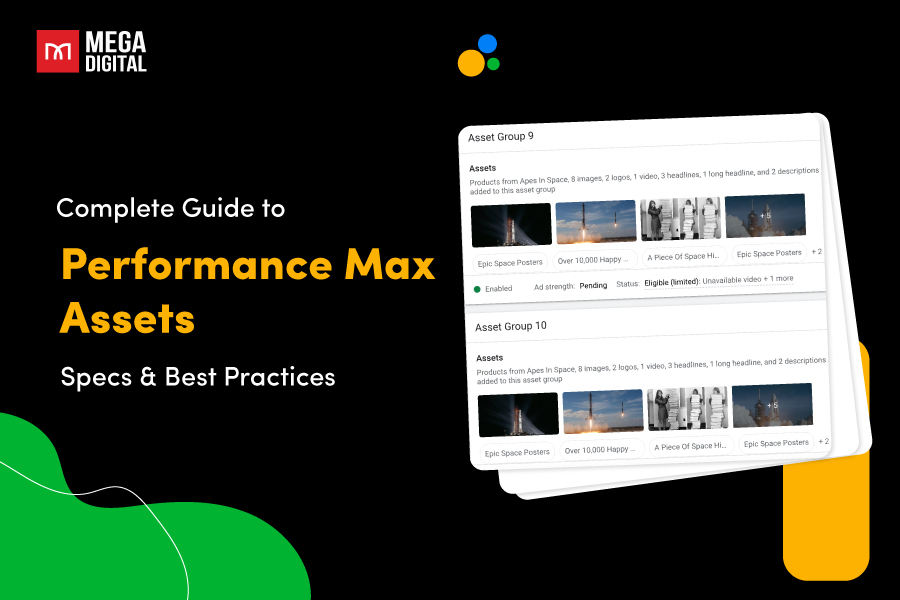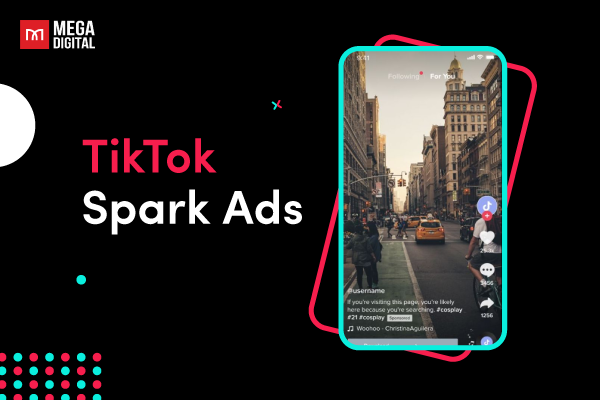Nowadays, potential buyers and sellers are turning to Google to find their dream homes. But how do you cut through the noise and ensure your listings are the ones they see? The answer lies in Google Ads, a tool that can transform your real estate business by putting your listings in front of the right people at the right time. In this blog post, I will provide you with strategies to leverage the power of Google Ads for real estate.
- How does Google Real Estate Ads work?
- Key benefits of Google Ads for Real Estate
- Which ad types are suitable for Google Real Estate Ads?
- How to set up your Real Estate Google Ads campaign?
- How much does it cost to run a Google Ads campaign for Real Estate?
- Best Practices for Google Ads for Real Estate
- Hire a professional Google Ads agency
- Case Studies
- FAQs about Google Real Estate Ads
How does Google Real Estate Ads work?
Before diving into setting up your Google Ads account, it’s important to understand the basics. Google Ads functions on a pay-per-click (PPC) basis, where businesses place bids on keywords that are relevant to them.
When a user performs a search on Google, the system selects from the pool of advertisers and determines a group of ‘winners’ to display in the ad space on the search results page. These ‘winners’ are selected based on several factors, including the quality and relevance of their keywords and ad campaigns, as well as the size of their keyword bids.
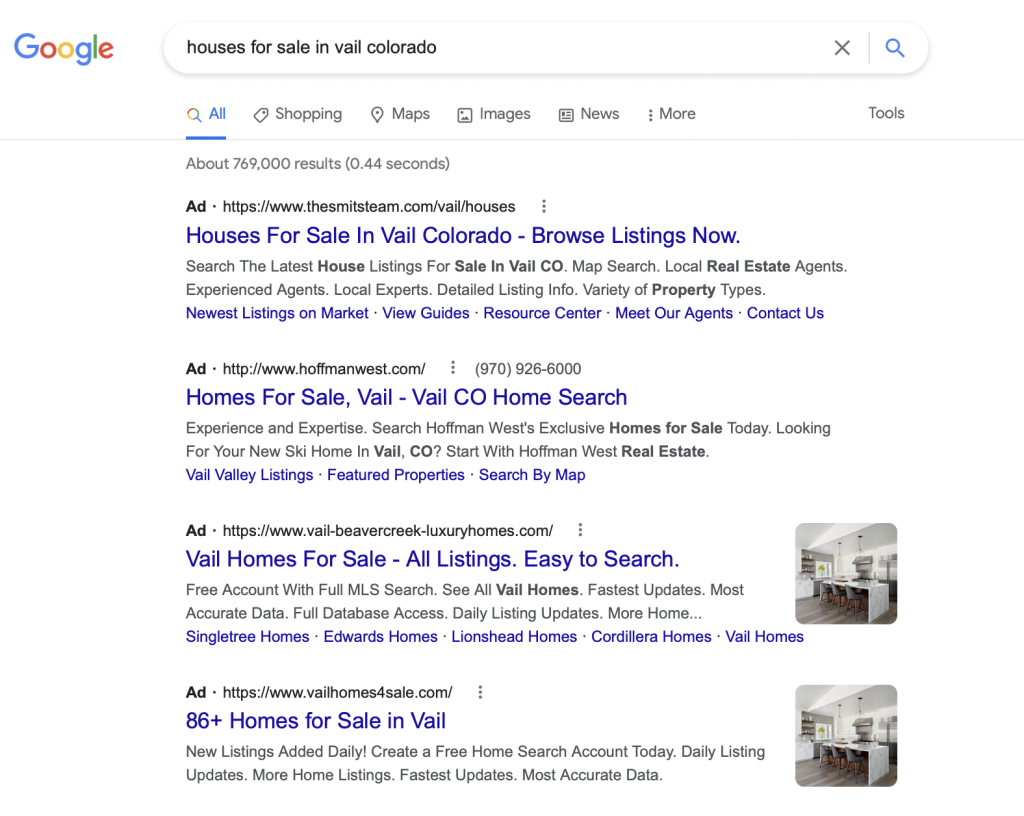
Key benefits of Google Ads for Real Estate
Here’s how leveraging Google Ads can supercharge your real estate agents:
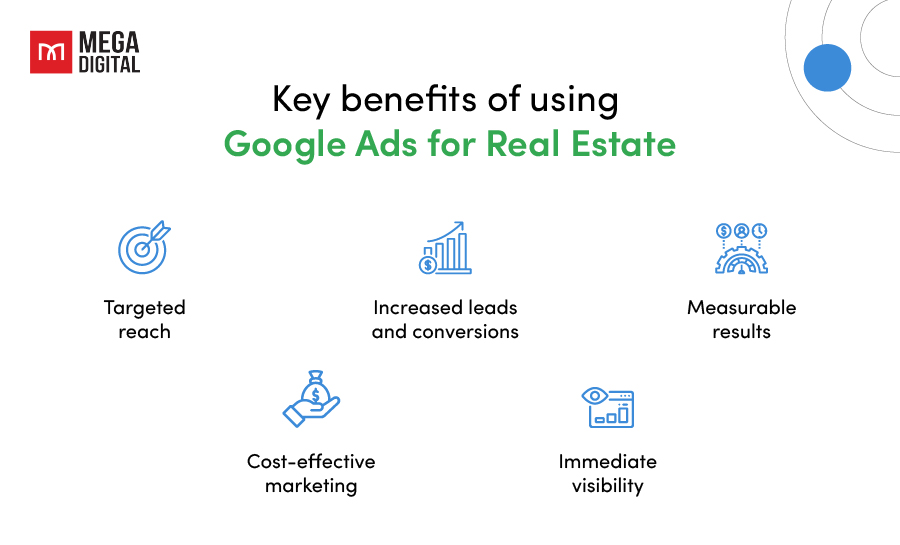
Targeted reach
Unlike traditional advertising methods, Google Ads allows you to target your ideal audience with laser precision. You can define specific demographics like age, income, location, and even interests related to property types (e.g., “first-time homebuyers” or “luxury property investors”). This ensures your ads are seen by highly relevant users who are actively searching for properties that align with your listings.
Increased leads and conversion rates
Getting your listings in front of the right people translates to more qualified leads and higher conversion rates. When users actively search for properties and see your targeted ads, they’re more likely to be interested in contacting you to learn more about your listings.
Measurable results
Unlike billboards or print ads, Google Ads offers tools that help you track key metrics like impressions, clicks, website visits, and even lead form submissions. This valuable data allows you to see exactly how your ad campaign is performing and optimize it for better results.
For example, by tracking website form submissions, you can identify which ad variations and keywords are most effective at generating leads for your specific listings.
Cost-effective marketing
Compared to traditional advertising channels, Google Ads can be a very cost-effective way to reach new clients. You set a daily budget and only pay when someone clicks on your ad. This allows you to control your spending and maximize your return on investment (ROI).
Immediate visibility
Unlike SEO (Search Engine Optimization) strategies that take time to show significant results, Google Ads can help you gain immediate visibility in search engine results pages (SERPs). Launching a Google Ads campaign can put your real estate listings at the top of search results for relevant keywords, ensuring potential buyers see your properties right away.
Which ad types are suitable for Google Real Estate Ads?
To effectively Google Ads for real estate, you should choose among these three main types of Google Ads: Search Ads, Display Ads, and Local Services Ads. These are designed to reach users who are actively seeking content related to real estate. This makes Google Ads an optimal tool for real estate agents and brokers aiming to connect with prospective buyers and sellers ready to engage in transactions.
- Search Ads: Search ads appear at the top of Google search results when users search for real estate-related keywords. They are targeted by keywords, making them particularly effective for reaching users who are actively searching for properties.
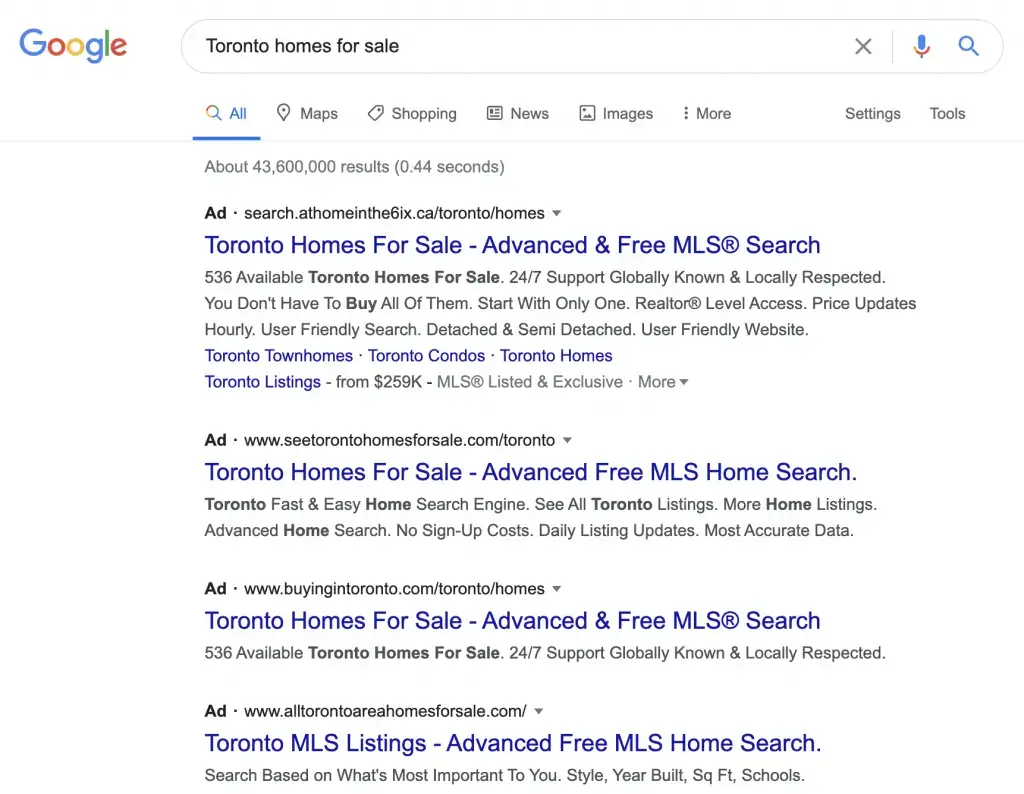
- Display Ads: Display ads are visual ads that appear on websites, apps, and social media platforms within the Google Display Network. They can include text, images, and videos, and can be targeted to specific demographics and behaviors. This makes them a powerful tool for raising brand awareness and reaching potential clients.

- Local Services Ads: Local services ads are prominently displayed at the top of SERPs. They are particularly visible in searches for real estate agents. Real estate agents are one of the few professionals who can also earn a “Google Screened” badge by submitting their licenses. This badge not only gives their profiles a green check mark but also prioritizes their placement in search results.
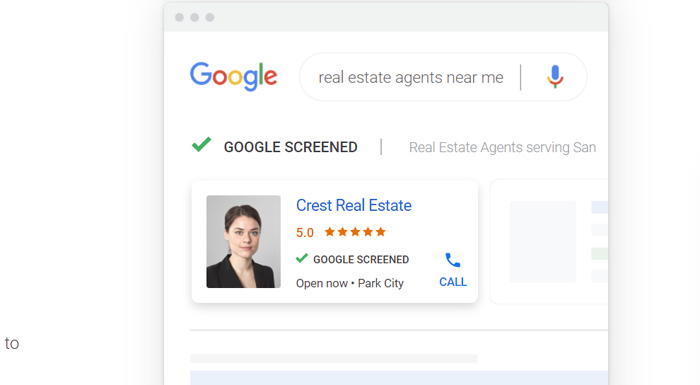
How to set up your Real Estate Google Ads campaign?
Now that you know the benefits Google Ads brings for real estate agents, you might want to jump right into running your first campaign. But where do you begin? Here’s a step-by-step guide to help you set up your real estate Google Ads campaign:
1. Define your objectives & target audience
Identify what you want to achieve with your ad campaign. Do you want to generate leads (website visits and form submissions), showcase property listings, or drive brand awareness for your real estate agency?
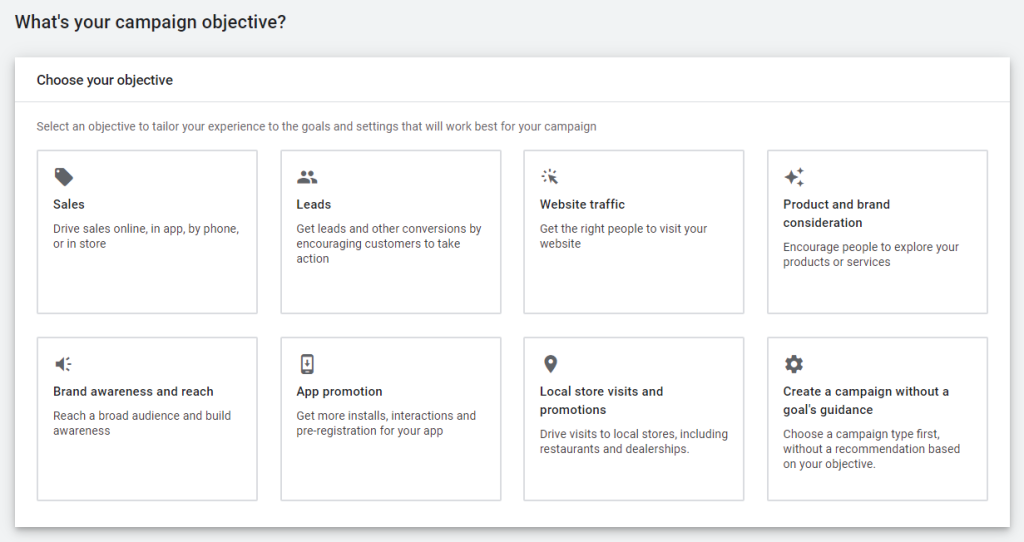
To identify your ideal client, you should focus on answering demographic questions related to age, income, location, and property-related interests.
2. Set your bidding strategy & budget
Decide on a bidding strategy for your ad campaign. Google Ads offers various bidding strategies, each with its own advantages. Here are a few common options for real estate:
- Maximize clicks: Aims to get the most website traffic within your budget.
- Target CPA (Cost-per-Acquisition): Focuses on generating leads while staying within a set cost per lead.
- Manual bidding: Offers greater control, allowing you to set maximum bids for each keyword.
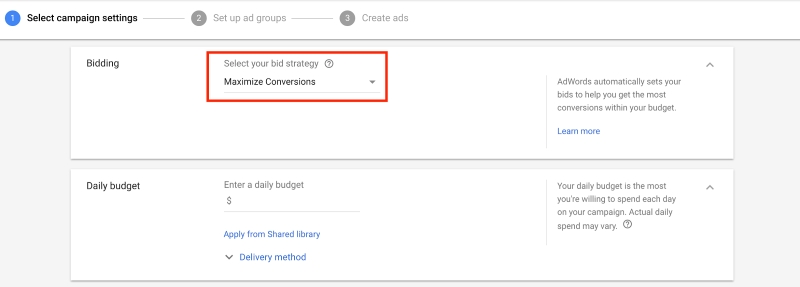
Next, determine a daily or monthly budget that aligns with your marketing goals and resources.
3. Set up location targeting
Define the geographic location where you want your ads to be shown. This could be a specific city, zip code, or a broader region based on your target market.
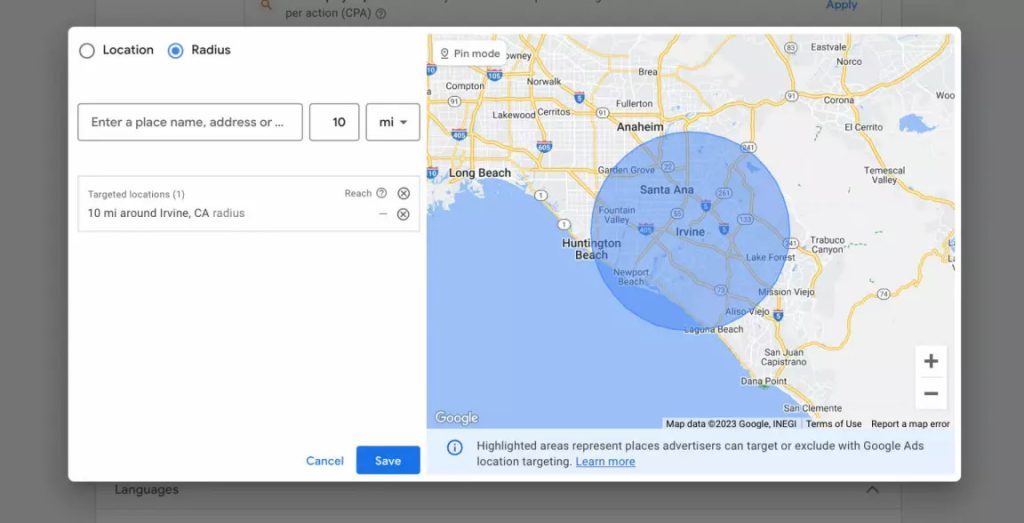
4. Select relevant keywords
Choose relevant keywords related to the types of properties you represent and the areas you serve. Use a mix of broad terms (e.g., “homes for sale”) and long-tail keywords (e.g., “waterfront condos in [city]”).
5. Write compelling ad copy
Craft clear and concise ad copy that highlights the unique selling points of your listings or services. Include a strong call to action (CTA) like “Learn More,” “Schedule a Showing,” or “Contact Us Today”.
6. Utilize ad extensions
Enhance your ads with extensions that provide additional information and improve click-through rates:
- Location extensions: Showcase your business address and phone number.
- Sitelink extensions: Add links to specific pages on your website, like property listings or contact forms.
- Call extensions: Allow potential customers to call you directly from the ad.
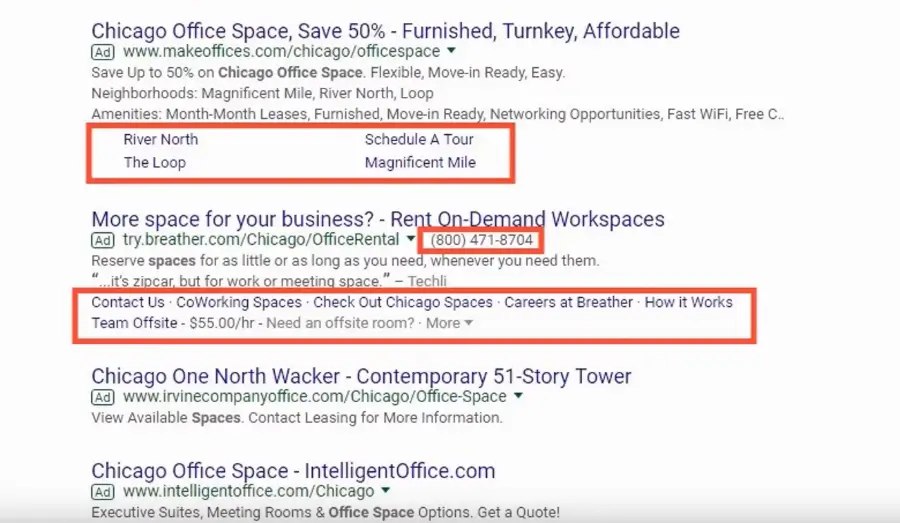
7. Optimize landing page
Ensure your website landing page provides a smooth user experience. The landing page should be relevant to your ad copy and entice users to take the desired action.
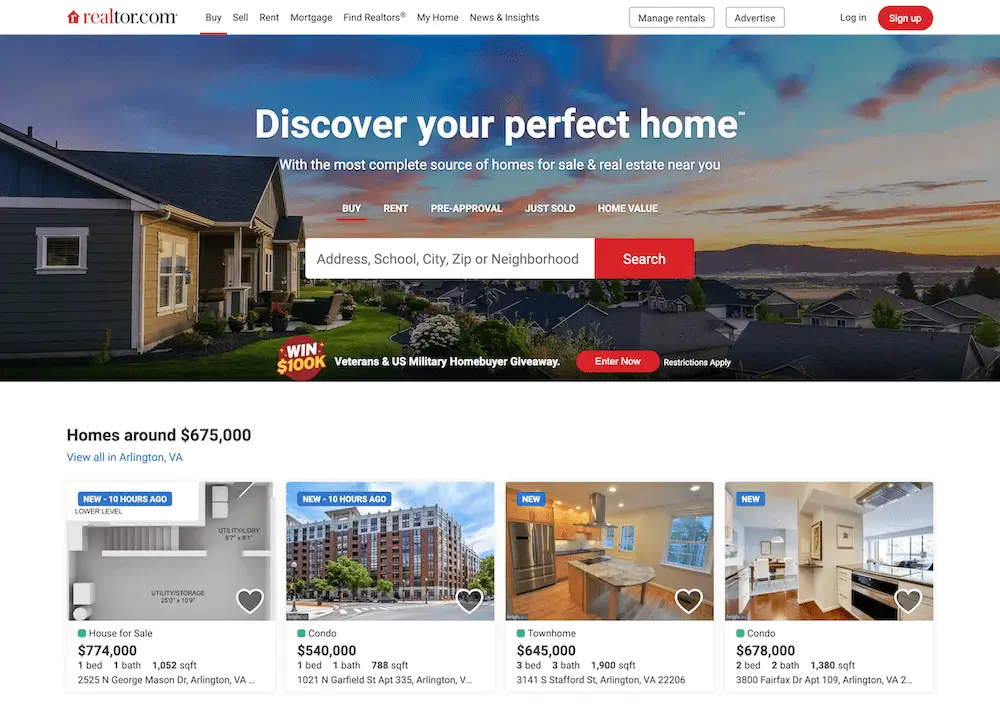
Furthermore, if you want to skip the manual setup or ensure higher ad stability and support, Mega Digital offers Google Ads agency accounts for rent.
With these agency accounts, you will get immediate access to a ready-to-use account, faster campaign launch, and priority support, so you can focus on closing deals instead of fixing account issues!
How much does it cost to run a Google Ads campaign for Real Estate?
The cost per click for the real estate industry is around $66. This is the amount you pay each time someone clicks on your ad. The actual cost will depend on the keywords you’re targeting and the competition for those keywords.
When budgeting for your real estate Google Ads campaign, consider these additional factors:
- Daily/monthly budget: Determine a comfortable daily or monthly budget that aligns with your overall marketing strategy.
- Campaign duration: Factor in the timeframe for your campaign. Short-term campaigns might require a higher daily spend to achieve visibility, whereas longer campaigns can benefit from budget optimization over time.
- Return on Investment (ROI): Ultimately, your ideal cost hinges on the return you see on your investment. Track conversions (leads generated) and measure them against your budget to determine your ROI.
>>> Read more: Google Ads Benchmarks 2023 by Industry [Original & Latest data]
Best Practices for Google Ads for Real Estate
To help you not only build the best campaigns on Google Ads that acquire lots of leads but also know how to convert them into real buyers, I have compiled a list of best practices you should follow:
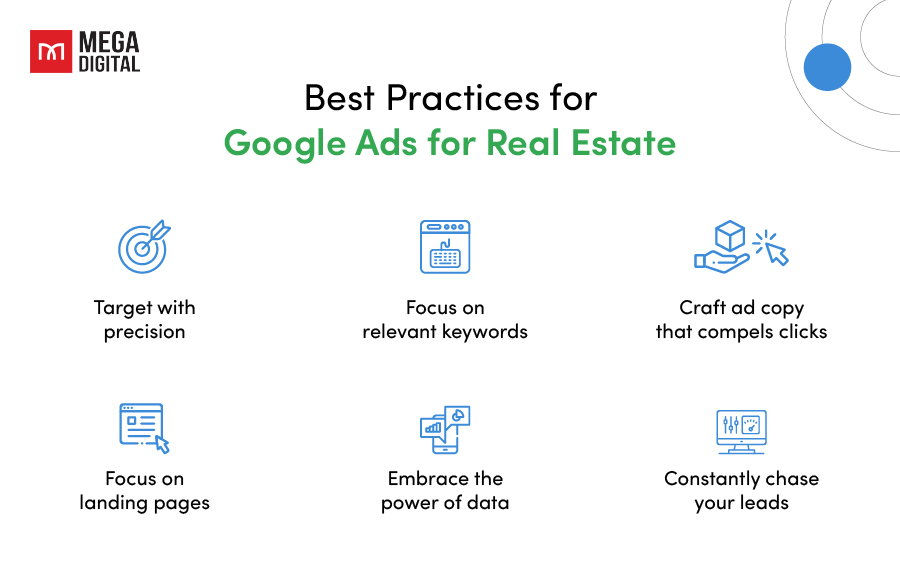
Target with precision
Real estate thrives on a hyper-local approach. Move beyond broad demographics and delve into the specifics. Focus your ads on targeted neighborhoods, zip codes, or even streets where your listings reside. Cater your message to the lifestyles of your ideal clients, whether it’s “first-time homebuyers” seeking their starter haven or “luxury property investors” on the hunt for prime locations.
Focus on relevant keywords
Choosing the right set of keywords is like using a magic stick. Broad terms like “homes for sale” can make people aware, but specific, long-tail phrases are your hidden tool. Reach out to people with particular needs by using keywords like “3-bedroom family homes in [school district]” or “[neighborhood name] apartments”.
If you’re promoting a specific residential complex, focus on branded keywords that are directly related to your product, such as real estate, neighborhood, and housing class. However, if you’re marketing a real estate agency with a variety of properties in different locations, your semantic range will need to be broader.
Consider the following search intents as a guide for choosing keywords for your real estate Google Ads:
- Service Type: sale, lease, exchange
- Building Material: brick, panel, monolithic, aerated concrete
- Housing Class: economy, business, comfort, luxury, elite
- Location: city, district, street, landmark
- Extra Features: parking, park, river, elevator, number of floors
- Room Count: single-room, studios, two-room, three-room
- Housing Estate Name, Builder, Agency: reviews, construction progress
- Property Category: new construction, secondary market, direct from builder
- Premises Details: layout, area, ceiling height
Remember, stay relevant! Regularly research trending terms and adapt your strategy based on seasonal shifts or market fluctuations.
Craft ad copy that compels clicks
Headlines are your hero. Craft captivating messages that grab attention and entice users to click. Highlight the unique selling points of your listings, showcase property types, or create a sense of urgency with limited-time offers.
Don’t just list features in your descriptions; focus on the benefits. Will the property provide a “short commute” for busy professionals or offer “spacious living for growing families”? Conclude with a clear call to action, leaving no room for confusion. Tell users what to do next, whether it’s “Schedule a Showing,” “Learn More,” or “Contact Us Today”.
Focus on landing pages
A seamless journey from ad click to conversion is paramount. Ensure your landing page aligns perfectly with your ad copy and offers a user-friendly experience. High-quality photos, clear and concise descriptions, and easy contact options are crucial elements. Keep in mind, make it easy for users to convert by including clear contact forms or calls to action that capture leads and nurture them into potential clients.
Embrace the power of data
Don’t be a passive observer. Regularly monitor your campaign’s performance metrics like impressions, clicks, and conversions. Leverage this data to make better decisions. Conduct A/B testing with various ad styles, keywords, and landing pages to optimize results. See what resonates best with your target audience and optimize your campaign accordingly. Google Ads also offers automated features like ad scheduling and budget optimization – embrace them to streamline your campaign management.
Hire a professional Google Ads agency
If you’re just starting out with Google Ads or if your campaigns aren’t delivering the desired results, it might be time to consider bringing in a professional agency, such as Mega Digital. As a Premier Partner agency of Google, Mega Digital specializes in helping real estate professionals like you navigate the complexities of Google Ads, and is committed to helping you run effective and compliant Google Ads campaigns that can drive more traffic to your listings, attract potential buyers or renters, and ultimately, help grow your real estate business. With our expertise, you can focus more on what you do best – selling properties.
Constantly chase your leads
The process of dealing with internet leads is slightly different from leads from other sources. This is primarily because a lead from the internet will require a bit more qualification to ensure they’re serious about buying.
To maximize lead conversion, I recommend you call each lead within five minutes of registration or at the start of the next working day if the lead comes in outside work hours. Quick contact increases the likelihood of securing an appointment.
Additionally, each lead should be contacted five times on the first day through various means such as text messages, emails, and phone calls to stay top of mind. Remember, getting a lead on the phone significantly increases the chances of them scheduling an appointment.
Case Studies
Several real estate businesses have found success using Google Ads. To underscore the efficacy of Google Ads for real estate agents, let’s dive into a couple of case studies:
Case Study 1: Compass
As a premier real estate agency, Compass Realty deployed Google Ads campaigns aimed at high-end condominium buyers in a sought-after metropolitan area. By zeroing in on long-tail keywords such as “home values in manhattan” and crafting engaging ad copy that spotlighted their unique amenities and locational benefits, Compass saw a marked rise in website traffic and qualified leads. Their conversion tracking revealed a 20% surge in condo viewings scheduled via their website, culminating in a sales boost.
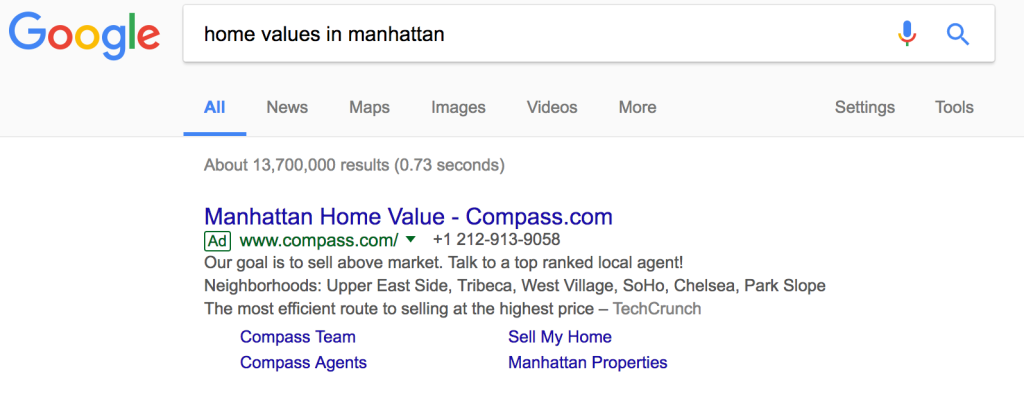
Case Study 2: ABC Property Management
ABC Property Management, a property management firm, leveraged Google Ads to draw in property owners in search of professional property management services. By focusing on keywords like “property management services Texas” and highlighting their expertise, bespoke approach, and cost-effective solutions, RV Resort Property Management experienced a 30% uptick in form submissions from property owners interested in their services. This resulted in a significant expansion of their client base and a substantial increase in overall revenue.

FAQs about Google Real Estate Ads
Before concluding this blog post, I want to briefly answer some of the most frequently asked questions on Google Ads for real estate.
How much should I spend on advertising on Google Ads?
The cost of Google Ads varies depending on factors like your bid amount, the competitiveness of your keywords, and the geographic area you’re targeting.
Is it possible to focus my ads on specific areas?
Yes, Google Ads provides you with features to target your ads to specific geographic locations.
How to measure the success of my Google Ads campaign?
Google Ads provides detailed analytics that can help you measure the success of your campaign, including the number of clicks your ads receive and the number of new leads generated.
Final Words
As we wrap up this discussion on Google Ads for real estate, it’s clear that this powerful platform can significantly boost your visibility in the digital marketplace. By strategically selecting keywords, understanding search intents, and continuously optimizing your campaigns, you can generate valuable leads and drive your real estate business to new heights. Stay ahead of the curve by embracing these digital marketing strategies, and watch your business flourish.







